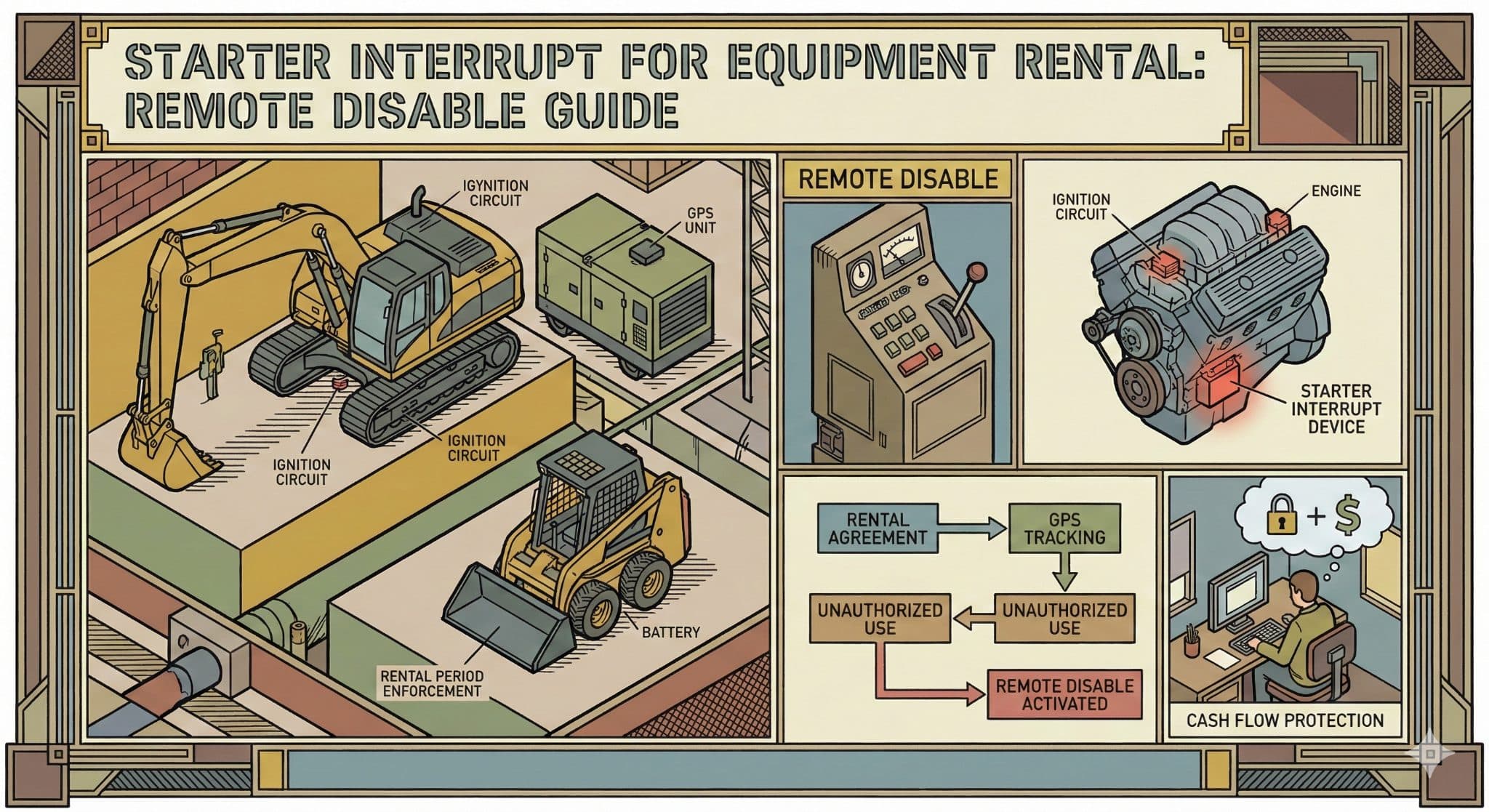Last Updated: February 2026
Key Takeaways
- Employee misuse of company vehicles costs businesses tens of thousands annually in wasted fuel, accelerated maintenance, and liability exposure.
- GPS tracking reduces unauthorized vehicle use, with one case study showing a 25% reduction in monthly fuel costs ($1,000+ in savings).
- Written vehicle-use policies, driving record checks, and comprehensive insurance plans create multi-layer protection against misuse.
- Real-time location monitoring deters reckless driving, reduces accident risk, and improves customer trust through professional fleet presentation.
- Combining GPS technology with management protocols stops misuse "in its tracks" while maintaining positive employee relationships.
If your business requires employees to use company vehicles, you've likely experienced—or at least heard whispers about—crew members misusing them.
It's a common challenge many businesses face. Sometimes, members of your team get a little too comfortable with their business vehicles and decide to take them for a spin off the clock—for personal trips or even side jobs. This exposes fleet vehicles to unnecessary wear and tear, drains the fuel tank quicker, and even increases your liability risk—all of which can cost you a pretty penny.
Six common ways that company vehicles are typically misused:
- Using company vehicles for personal reasons
- Using company vehicles during unauthorized times
- Driving unsafely and violating traffic laws
- Carrying dangerous or unauthorized cargo
- Not servicing or maintaining the vehicle properly
- Tampering with the vehicle in unauthorized ways
So, how do you put unauthorized vehicle use to a halt?
In this blog post, we'll discuss five major consequences of employee misuse of company vehicles and five ways to combat it.
5 Major Consequences of Company Vehicle Misuse
If you've already experienced misuse of your fleet vehicles, you know the dangers that come with this violation of trust. While some businesses are lucky enough to scrape by with barely any damage, many end up mired in legal and financial consequences.
If you're simply being proactive, you understand the reality of vehicle misuse and how often it actually happens.
Whatever your reason for investigating a solution to this problem, let's take a look at three ways employee misuse of company vehicles can negatively impact both your pocketbook and your company's reputation.
1. Increased Maintenance Costs
Off-the-clock driving means your vehicles rack up more mileage and more time on the road. Automobiles rarely ever appreciate in value, and hastening depreciation can cost your business big time. Unnecessary wear and tear means more time in the shop and more cash spent on repairs and tune-ups.
Of course, not every employee who uses a company vehicle off-hours will tear through the streets to live out their Fast and Furious fantasies, but even the best driver can't change the fact that vehicles are ticking time bombs. The more mileage your drivers put on them, the sooner they'll need to be replaced.
The employee may also be ignoring problems with the vehicle, such as “check engine lights” or low oil. Delaying the repair of these issues can greatly decrease the value of the company vehicle.
2. Increased Fuel Costs
This goes hand-in-hand with the previous point. If you cover the cost of fuel for your drivers—and they're operating your vehicles off the clock—you can expect to pay more.
And if you have no way to document that a vehicle was used for non-work purposes, some employees won't bat an eye at using your vehicles to run errands, do side work, or take joy rides—all on your dime.
In a recent Hapn case study, the owner of Freedom Drywall reported that before she figured out employees were misusing her fleet vehicles, she was spending almost $2,000 every two weeks on gas alone. After using GPS tracking to put a stop to unauthorized vehicle use, she reduced her company's monthly fuel costs by a whopping 25%, saving about $1,000 per month.
3. Increased Liability Risk
As a vehicle-dependent business, you already have to juggle risk and liability with insurance, employee policies, contracts, and more. But the liability doesn't go away when your employees decide to go galavanting on the weekend.
Accidents and unforeseen events are already some of your worst nightmares, but unauthorized use makes them even scarier—especially if there's a non-employee involved. Ride-alongs are incredibly risky, as any non-employee involved in an accident can sue your business for damages. It doesn't matter whether you knew your company vehicle was being driven off the clock—the liability is still the same.
In addition to deterring employees from using company vehicles for non-work purposes, GPS tracking devices make workers less likely to speed and drive recklessly. This can drastically improve driver safety and protect your reputation by keeping accidents and fines at bay.
4. Higher Insurance Premiums and Deductibles
Misuse of company vehicles and equipment can result in issues that impact your insurance costs. If an employee is driving a vehicle unsafely, or leaving equipment in locations where it can be stolen, insurance deductibles will likely increase.
5. Loss of Customer Trust
An employee who misuses a company vehicle or leaves it in a messy condition can cause a customer to have a negative experience with your company. This is especially true if the customer is due to be driven in the vehicle. If you rent out vehicles or equipment, employee misuse can also lead to malfunctions and negatively affect the customer’s experience.
See How Hapn Works for Your Fleet
Real-time GPS tracking, geofencing, driver behavior monitoring, and comprehensive reporting — all in one unified platform.
See How Hapn Works →5 Ways to Halt Employee Misuse of Company Vehicles
Big or small, the effects of vehicle misuse add up over time. If you fail to nip it in the bud now, you could find yourself in a big pickle later. But how can you bring vehicle misuse to a screeching halt while maintaining a positive employee-employer relationship?
1. Invest in a GPS Tracking System
There's a reason so many businesses use GPS trackers to monitor their fleet vehicles and equipment: tracking your vehicles prevents loss due to theft, encourages responsible driving, and lets managers and owners see every trip in every company car.
But GPS trackers aren't just beneficial for business owners. In a recent case study, the owner of Freedom Drywall said her crew was initially reluctant to accept tracker installation in company trucks. Eventually, though, they realized they weren't spending as much time communicating about their schedules and locations by phone. Plus, they knew they'd have instant backup if they ever broke down or got into an accident.
The truth is, it's difficult to end a problem that you don't have proof of in the first place—that is, if you want to foster trust-based relationships with your employees.
Thankfully, GPS tracking makes documentation easy.
Someone uses a fleet vehicle as their whip to the club on a Saturday night? You get a notification—and with a single tap or click, you can view that vehicle's real-time location. (You can also create a report detailing where it went after the fact, which can come in handy when confronting an employee about the trip in question.) Someone stole a truck from the lot? Track its location within seconds.
GPS tracking and Telematics can also allow you to know if there are engine issues that are occurring and being ignored. As soon as the oil needs to be topped off, you can get alerted in your GPS apps instead of relying on the employee to ignore it or worse.
2. Create Company Vehicle Use Policies and Protocols
Speaking of documentation: Draft up a company vehicle use policy detailing exactly how vehicles should be used. Include protocols that specify what to do if an accident or unforeseen event arises. Then, have everyone on your team sign it.
With written documentation and employee signatures on record, anyone who misuses a company vehicle will have breached the contract—and that's grounds for termination.
Of course, you can still grant the ability to break protocol under certain circumstances—with permission. Key word: permission. No one should be using vehicles outside of contractual guidelines without your authorized consent.
3. Check Driving Records Before Hiring Employees
If you don't do so already, start checking the driving records of potential employees before hiring them. If they're going to be driving vehicles branded with your company name, they need to be safe, responsible drivers with a clean record.
If a candidate has an excessive number of speeding tickets, outstanding fines, DWIs, or other transgressions, that should be a red flag. If you decide to take a chance on them, do so with caution.
While this likely won't do much to improve your current team's habits, intentionally hiring responsible drivers can certainly help mitigate issues down the line.
4. Choose a Comprehensive Insurance Plan Over a Basic Plan
Basic insurance plans work well for super small businesses that are just getting started. But if you can afford it, opt for a comprehensive insurance plan instead.
More specifically, look for a plan that covers losses and common repairs. While it might be more expensive month-to-month, comprehensive plans can keep your wallet fuller in the long run.
There are lots of ways to save on your commercial auto insurance premiums—and installing GPS tracking devices is one of them. Be sure to read up on tips for cutting those costs for the benefit of your business.
5. Keep an Airtight Record of Driver Information and Vehicle Whereabouts
Finally, keep records for all your drivers and vehicles. These records should include employees' current licenses and company vehicle histories. Having easy, reliable access to this information will be crucial in the event of a legal situation.
Can you hear it? That's employee vehicle misuse coming to a screeching halt. Whether you've already forked over loads of cash on unnecessary maintenance or legal costs—or you've heard the horror stories and are taking preventative action—these five tips are sure to stop vehicle misuse in its tracks.
Written by the Hapn Team
Hapn provides GPS fleet and asset tracking for 50,000+ customers across construction, equipment rental, and 50+ other industries. Our platform monitors 463,000+ assets and processes over 4 billion messages annually with 99.9% uptime.
Frequently Asked Questions
How can GPS tracking stop employee vehicle misuse?
GPS tracking provides real-time visibility into vehicle location and usage. When employees know their movements are monitored, unauthorized use drops significantly. You can identify off-hours trips, create detailed reports for employee conversations, and back up policies with concrete evidence.
What should a company vehicle-use policy include?
A comprehensive policy should specify authorized use, personal-use restrictions, prohibited driving behaviors, maintenance responsibilities, accident reporting procedures, and consequences for violations. Have all employees sign it to establish contractual obligations and document compliance.
Can GPS tracking improve driver safety?
Yes. When drivers know they're monitored, they're more likely to follow speed limits, avoid reckless driving, and be more attentive. GPS tracking also helps you identify high-risk drivers and provide targeted safety coaching, reducing accident rates and insurance claims.
How much can GPS tracking save on fuel costs?
Results vary by company, but documented case studies show savings of 15–25% on fuel expenses after implementing GPS tracking. Savings come from eliminating unauthorized use, optimizing routes, and reducing idling and excessive speed.
Stop Vehicle Misuse Today
Hapn's unified fleet tracking platform gives you real-time visibility, automated alerts, compliance reporting, and driver behavior insights — all designed to stop unauthorized use while maintaining positive team relationships.
Get Pricing →

